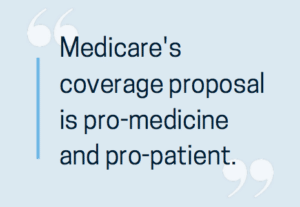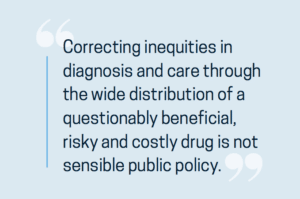By Daniel Gibbs, MD, retired neurologist and author, and Jason Karlawish, MD, co-director of the Penn Memory Center, geriatrician, and author
Both of us are physicians dedicated to the care of persons living with Alzheimer’s disease. We’ve heard thousands of moving stories from persons struggling with a fading capacity to exercise their free will and their friends and family members devoting time, effort, and resources to care for them. We feel their desperation.
For one of us, this feeling isn’t simply professional. It’s intensely personal. Nine years ago, Dan retired from practicing neurology because of mild cognitive impairment (MCI) caused by Alzheimer’s disease.

After reviewing public comments, in April, Medicare will issue a final proposal. We urge Medicare to persevere with the plan to cover the drug for patients who are enrolled in a study designed to prove it is effective and therefore a reasonable and necessary treatment. It assures patients use good information, not desperation, to choose wisely whether Aduhelm is right for them.
Usually, Medicare coverage follows FDA approval as day follows night. The problem with Aduhelm is simple. We don’t know if it’s worth the risk.
Biogen’s two identical phase 3 trials failed to show consistent and compelling efficacy. The studies’ designs were peppered with missteps and mid-course corrections, chief among them a faulty interim look at the data. Even the most optimistic take on the results shows any benefit compared to placebo falls below a standard considered clinically significant.
We do know the drug can harm a patient like Dan. We know this not simply because we’ve read the medical literature, but because Dan was a research subject in one of Biogen’s two controversial phase 3 trials. After just four doses of Aduhelm, he became ill. Even now, his recollections are vivid: “I had the worst headache of my life and extremely high blood pressure. I became confused and lost the ability to read. An MRI showed multiple patches of edema and tiny bleeds called microhemorrhages throughout my brain. I needed care in an ICU. High doses of steroids finally reduced the edema.”
Dan was lucky. Aside from Alzheimer’s disease, he’s an otherwise healthy person. Still, complete recovery took several months.
This brain edema and bleeding are known risks of drugs like aducanumab that target amyloid in the brain. Amyloid-related imaging abnormalities, or ARIA for short, occurred in 41.3% of subjects in the two trials who received the drug at the FDA approved dose. ARIA caused 6.2% of participants to stop treatment. These data, from trials that enroll generally healthy research subjects and are run by expert clinicians who carefully supervised dosing and monitoring, are a warning for what clinical practice in patients who have other diseases might be like.
Are these risks outweighed by benefits? An FDA advisory committee’s answer to this question was an unequivocal no. FDA disagreed and approved aducanumab anyway, arguing that the drug lowers amyloid and this might translate into benefits to a patient. Notably, FDA never asked an advisory committee to consider that argument.
The agency used a set of regulations designed to speed drug approval for serious disease without effective treatments, diseases like Alzheimer’s. These regulations, called accelerated approval, allow FDA to approve a drug because it changes a surrogate, a marker of the disease pathology (in this case, amyloid) and has the expectation that this change “is reasonably likely to predict” improvements in patients’ health and well-being. A good drug for accelerated approval is one that, at the time of the approval, is also being studied to prove the connections between biomarker, drug, and benefit to patients. That wasn’t the case with Aduhelm.
Those studies – two flawed studies designed to measure clinical benefit – have already been done. Their data sets are quite valuable for the design of a study to prove once and for all whether Aduhelm is effective, not to launch it into clinical practice.
In an open letter, Harry Johns, Chief Executive Officer of the Alzheimer’s Association, decried Medicare’s proposal as unjust. “With the approach proposed by CMS, access to treatment would now only be available to a privileged few — those with access to research institutions — exacerbating and creating further health inequities.” He called the proposal “shocking discrimination against everyone with Alzheimer’s disease, especially those who are already disproportionately impacted by this fatal disease, including women, Blacks and Hispanics.”
For a drug with these risks, a person must have an accurate diagnosis of MCI or mild stage dementia due to Alzheimer’s disease. They will need multiple imaging studies to confirm their diagnosis and genetic testing inform their risk of ARIA. This complexity adds up to a drug that ought to be prescribed by doctors like us, clinicians expert in the diagnosis and care of Alzheimer’s disease.

As is typical in American politics, we’ve arrived at a grand compromise. FDA and Medicare are aligned. FDA is requiring Biogen to conduct a confirmatory randomized and controlled clinical trial to prove the drug is safe and effective. Such a study could be done as part of Medicare’s proposal for coverage with evidence development.
If aducanumab were an effective drug – and it might be – its risks might be acceptable, but we don’t know if it’s effective. Medicare’s coverage proposal is pro-medicine and pro-patient.
The CMS proposal is open for public comment until February 10, 2022.
